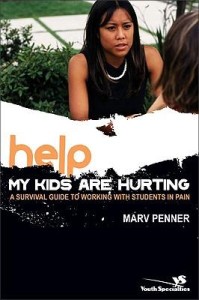This week I’ve had some interesting conversations about suicide with Marv Penner. Marv is a dear friend, one of our Associate Staffers here at CPYU, and the author of “Help! My Kids Are Hurting.” In today’s guest post, Marv offers seasoned wisdom on some very valid concerns related to suicide, our response, the compassion we show, and some surprising consequences related to how we respond.
Some suicides are more visible than others. For every story that makes CNN there are thousands of these tragedies that are hidden from view to all but those who are closest to the friends and family left in their heart-wrenching wake. The pain felt by those who remain is linked forever to the pain that precipitated the lonely decision in the first place. The injustice of a life cut short can seem overwhelming as “survivors” swim in a sea of unanswerable questions.
For those of us who have the opportunity (privilege) of standing on that holy ground of unspeakable grief with parents, siblings, friends, and loved ones, the desire to bring hope where there is only despair is appropriate and timely. I am appalled at the thought that we could respond with anything other than comfort, gentleness and a thoughtful quiet presence in such moments. Our responsibility to care for one another in these circumstances is non-negotiable. I can only imagine the deep satisfaction our heavenly Father must feel in seeing His children carrying one another’s burdens – weeping with those who weep – comforting those who mourn in these times of absolute brokenness.
But, I have a haunting question. Is it possible that in our genuine desire to be agents of healing we might be communicating a subtle secondary message – absolutely unintended, but nevertheless heard by some? I’m talking about the message that suicide is a reasonable, viable and appropriate option in some circumstances.
The “why?” question always dominates when a suicide occurs and in the untangling of the complex emotional web (hindsight is often 20/20) the precursors begin to emerge – pain… despair… loneliness… bullying… alienation… Of course, the presence of these realities can help make sense of the senselessness. Somehow, they soften the punch to the gut, and rightly so. But while the presence of profound pain can help demystify the decision to end one’s life, it should never be presented as justification.
Life is fragile at best. Suicide is irreversible. As the stories become more common, and the themes become more familiar let’s be careful to ensure that compassion and understanding aren’t heard as permission.
For most who come to the point of suicide there is a sense that all other options have been exhausted. Our responsibility as God’s people on this planet is to ensure that every person in our community has a range of options that not only keep them alive, but point them in the direction of true hope and healing.
And when another tragic death occurs, let’s be intentionally present in the lives of those who are left behind, listening as they sort through the memories, sharing in the anguish they bear and resting in the goodness of our Heavenly Father whose mercies are new every morning.

Great perspective. I appreciate your thoughtful handling of the subject, Marv.
Such a timely topic. When I think back, I did not personally know anyone who committed suicide until I was in college. My 20 year old daughter graduated from only a slightly larger high school and at least 10 members of her class had committed suicide before they would have graduated. (And since we only know a portion of actual suicides, there were probably more!) This is a problem that is growing and the church needs to speak to it.
Because those left behind are more at risk, we need to be reaching out to them, dismissing suicide as a reasonable alternative/solution and a destructive one as well.